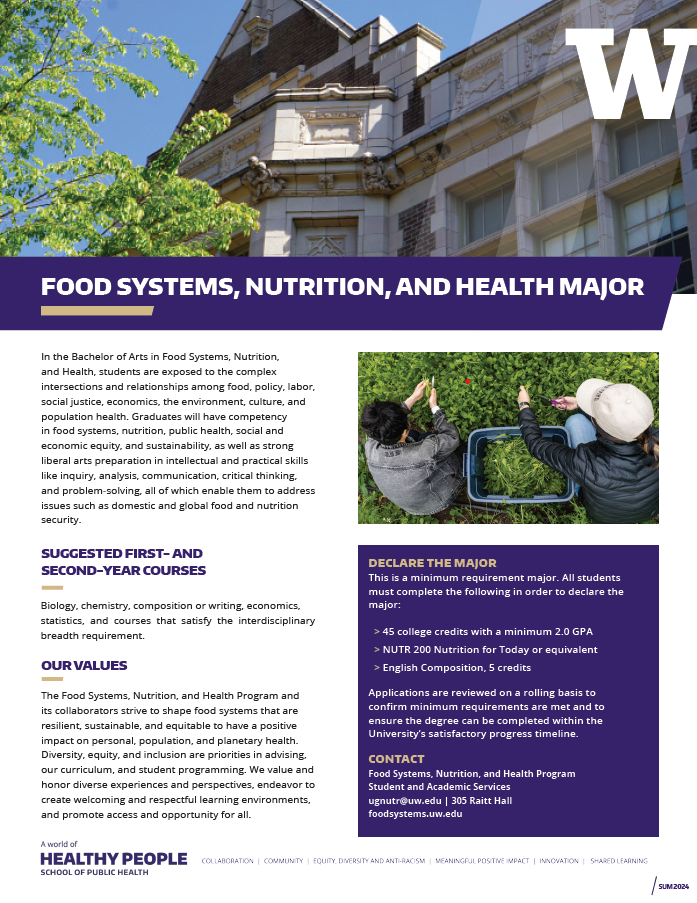Food Systems Major Requirements
You must complete all major requirements outlined on this page and the general education requirements for the School of Public Health.
Suggested first- and second-year courses: biology, chemistry, composition or writing, economics, nutrition, statistics, and courses that satisfy the Interdisciplinary Breadth requirement.
Course Listings
5 credits of biology. Choose from:
| BIOL 118 | Survey of Physiology (5, preferred) |
| BIOL 180 | Introductory Biology (5) |
| BIOL 161/162 | As earned through Advanced Placement testing |
5 credits of chemistry. Choose from:
| CHEM 120 | Principles of Chemistry I (5) |
| CHEM 142 | General Chemistry (5) |
| CHEM 143 | Accelerated General Chemistry (6) |
| CHEM 145 | Honors General Chemistry (5) |
5 credits of Economics. Choose from:
| ECON 200 | Introduction to Microeconomics (5) |
| FISH 230 | Economics of Fisheries and Oceans (5) |
| ESRM 235 | Introduction to Environmental Economics (5) |
10 credits from courses that represent the breadth of areas that influence food systems. Choose from:
| ACCTG 219 | Essentials of Accounting (4) |
| AES 150 | In-Justice for All: Intersection of Race, Ethnicity, Class, and Gender in the United States (5) |
| AES 151 | Identities, Cultures, and Power Across American Ethnic Groups (5) |
| ANTH 210 | Introduction to Environmental Anthropology (5) |
| ANTH 215 | Introduction to Medical Anthropology and Global Health (5) |
| ANTH/AES/ENVIR 211 | Environmental Justice (5) |
| ATM S 100 | Climate, Justice, and Energy Solutions (5) |
| ATM S 101 | Weather (5) |
| ATMS 111 | Global Warming: Understanding the Issues (5) |
| ATMS 211 | Climate and Climate Change (5) |
| B E 220 | Cities, Health, and Well-Being (3) |
| CEP 200 | Introduction to Community and Environmental Planning (5) |
| COM 220 | Introduction to Public Speaking (5) |
| COM 234 | Public Debate (5) |
| COM 289 | Communication, Power, and Difference (5) |
| CSE 142 | Computer Programming I (4) |
| CSE 143 | Computer Programming II* (5) |
| ECON 201 | Introduction to Macroeconomics* (5) |
| ENV H 111 | Exploring Environment and Health Connections (3) |
| ENVIR 100 | Introduction to Environmental Studies (5) |
| ENVIR 239 | Sustainability: Personal Choices, Broad Impacts (5) |
| ENVIR 240 | The Urban Farm (5) |
| ENVIR 280 | Natural History of the Puget Sound Region (5) |
| EPI 221 | Maternal and Child Health-a Population Health Approach (5) |
| ESRM 100 | Introduction to Environmental Science (5) |
| ESRM 210 | Introductory Soils (5) |
| ESS 101 | Introduction to Geology & Societal Impacts (5) |
| GEOG 123 | Introduction to Globalization (5) |
| GEOG 208 | Geography of the World Economy: Regional Fortunes and the Rise of Global Markets (5) |
| GEOG 271 | Geography of Food and Eating (5) |
| GEOG 272 | Geographies of Environmental Justice (5) |
| GEOG 280 | Introduction to the Geography of Health and Healthcare (5) |
| G H 101/JSIS B/GEOG 180 | Introduction to Global Health: Disparities, Determinants, Policies, and Outcomes (5) |
| G H/ENV H 220 | Global Environmental Change and Public Health (3) |
| GWSS 244 | Indigenous Feminisms (5) |
| HSERV 100 | Personal and Public Health (3) |
| HSERV 204 | Communicating about Health: Current Issues and Perspectives (3) |
| HSTAA/ENVIR 221 | US Environmental History: Ecology, Culture, Justice (5) |
| HSTAA 231 | Race And American History (5) |
| HSTCMP 247 | Global Health Histories: Colonial Medicine, Public Health, and International Health in the Global South (5) |
| NMETH | Science, Evidence and Health: Mastering Health Information and Personal Health Technologies (4/5) |
| NURS 211 | Power, Oppression, and Social Justice in Health and Healthcare (5) |
| NURS 215 | Disaster Management, Risk Reduction and Health (5) |
| NUTR 141 | Introduction to Foods (5) |
| NUTR 241 | Culinary Nutrition Science (3) |
| NUTR 341 | Exploration of Multisensory Dining* (3) |
| OCEAN 101 | Oceanography of the Pacific Northwest (5) |
| OCEAN 102 | The Changing Oceans (5) |
| PHIL/ETHICS/POL S 207 | Issues of Global Justice (5) |
| PHIL/ENVIR 243 | Environmental Ethics (5) |
| POL S 202 | Introduction to American Politics (5) |
| POL S 204 | Introduction to Comparative Politics (5) |
| POL S/HSTCMP 249/SOC 266 | Introduction to Labor Studies (5) |
| PUBPOL 201 | Introduction to Public Policy and Governance (5) |
| SMEA/ENVIR/JSIS B 103 | Society and the Oceans (5) |
| SMEA/ENVIR 201 | Climate Governance: How Individuals, Communities, NGOs, Firms, and Governments Can Solve the Climate Crisis (5) |
| SOC 110 | Survey of Sociology (5) |
| SOC 230 | Introduction to Racial and Ethnic Health Disparities in the United States (5) |
| URBDP 200 | Introduction to Urbanization: Planning and Designing Alternative Urban Futures (5) |
*Course has one or more prerequisites.
4-5 credits of statistics. Choose from:
| BIOST 310 | Biostatistics for the Health Sciences (4) |
| QMETH 201 | Introduction to Statistical Methods (4) |
| Q SCI 381 | Introduction to Probability and Statistics (5) |
| STAT 220 | Statistical Reasoning (5) |
| STAT 221 | Statistical Concepts and Methods for the Social Sciences (5) |
| STAT 290 | Advanced Placement (AP) Statistics (5) |
| STAT 311 | Elements of Statistical Methods (5) |
5 credits of qualitative methods. Choose from:
| ENVIR 301 | Research Methods in Environmental Studies (5) |
| GEOG 425 | Qualitative Methodology in Geography (5) |
| NUTR 202 | Research Methods in Food Systems, Nutrition, and Health (5) |
| SOC 300 | Foundations of Social Inquiry (5) |
30 credits, with cumulative 2.0 GPA.
| NUTR 200 | Nutrition for Today (5) |
| NUTR 302 | Food Systems: Harvest to Health (5) |
| NUTR 303 | Food Systems: Individual to Population Health (5) |
| NUTR 402 | Food Systems Modeling & Analysis (5) |
| NUTR 412 | US Food Systems Policy (5) Writing |
| NUTR 493 | Food Systems Capstone (6) |
Electives and Concentrations
You will choose a minimum of 20 credits of 300- and 400-level courses organized around 4 concentrations as electives. Concentrations, which do not appear on your transcript, allow you to focus electives on broad areas that impact these systems. These concentrations are:
- Business, Economics, & Marketing: advertising, business, communication, consumers, distribution, economics, entrepreneurship, food production, informatics, law, leadership, marketing, retail
- Environment & Sustainability: agriculture, agroecology, built environment, climate change, environment, global food security, GIS, hunger, urban food systems, sustainability
- Nutrition & Health Equity: dietary guidelines, disease prevention, exercise, environmental health, equity, food safety, global health, nutrition, public health
- Social & Economic Equity: communication, culture, determinants of health, geography, empowerment, inequality, intersectionality, justice, policy, poverty, society
The list of approved electives (pdf) includes information about how to check registration restrictions for these courses; limitations on the number of food systems related internship, study abroad, service learning, and research credits that can be applied towards this requirement; and the course substitution process.
More Information
- Sample course plan (pdf)
- Sample transfer course plan (pdf)
- Learning objectives
- Approved interdisciplinary breadth courses (pdf)
- Approved upper-division course electives (pdf)
Find procedures, policies, forms and more resources for completing the Food Systems, Nutrition, and Health major in the Current Students section.



